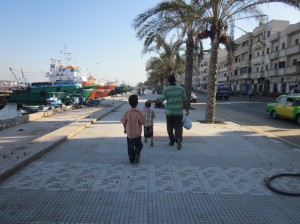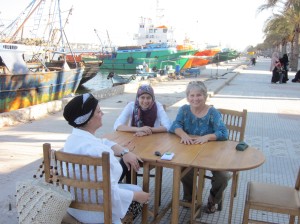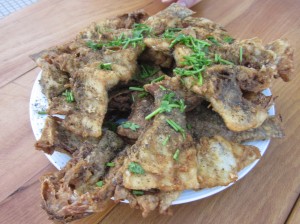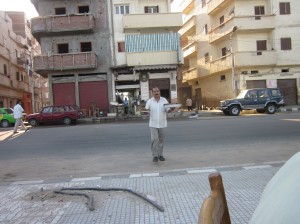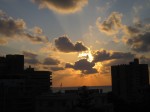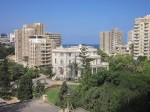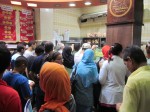We just got back from a three-day trip to Cairo and now I feel like a local Alexandrian.
Cairo was interesting, but hard to get around in. I’d compare it to spending three days in Manhattan and not being able to speak much English. We took a morning train on the 13th, went to an in-country orientation on the 14th, and stayed at a Fulbright apartment for both nights.
Traveling from Alexandria in the early morning, wesaw more of the countryside than we did on our previous road trip, because there were no roadside establishments, just farmland. Outside Ramses Station in Cairo we were met by taxi drivers wanting 50 pounds Egyptian (50 £E) to take us to our destination. The difficulty was that we were western looking, couldn’t speak much of the language, and, worst, we had no idea what a fair fare should be (but knew it should be substantially less than 50 £E.) So we wandered out into the street thinking we could do a little better; but it was hot and we really didn’t have a clue. Fortunately, a few bystanders speaking a little English flagged down taxis and tried to negotiate for us. We finally agreed to pay 20 £E. That was probably too much, but only about $3.25 USD. So, seriously, what do you do when it’s hot and humid and you don’t speak the language? One of the compounding problems was that the apartment was on a street behind the Marriott, so that was the landmark we gave the driver. Of course he just assumed we really wanted to go to the Marriott, which charges a ridiculous amount for their rooms, so we must be rich. Nonetheless, we did end up where we were supposed to, and eventually somebody showed up with a key.
The Fulbright apartment is in the Zamalek section of Cairo, an island within the city, much like Manhattan, although a lot smaller. While exploring the neighborhood, we discovered that it is home to many embassies. We passed the Sri Lankan, Algerian, Tunisian, Dutch, and a few more embassies that I can’t recall. That, of course, means that there are nice shops and restaurants in the area. We saw our first Egyptian liquor store here; a place called Drinkies, really, Drinkies, where we bought a bottle of South African Merlot. We enjoyed a beer with our dinner at L’Aubergine, a pleasant restaurant with a number of vegetarian options. It was our first alcohol since we arrived in Egypt over three weeks ago.
As slow as Alexandria traffic is sometimes, it’s slower in Cairo, which is surprising, as it seems there are no longer any donkey-pulled carts in Cairo, unlike Alexandria. Cairo offers more goods and services, like coffee shops with Internet connections and liquor stores. Just down the street from the Fulbright apartment is a place called Beano’s, with relatively expensive but very good American-style coffee and wifi for less than $1 USD an hour. Alcohol seems to be relatively readily available, at least in this neighborhood. There seems to be a lower proportion of women with head coverings than in Alexandria. That may be just because there are more foreigners, and more people in general, but it definitely leaves a different impression. It appears to be a significantly more cosmopolitan city.
It was pleasant to get up on Wednesday morning and go to the coffee shop for coffee, breakfast, and checking our email. The orientation was at the U.S. Embassy and it didn’t seem that far away, so we thought we would walk. While it really wasn’t that far away as distance goes, it was hot, too hot to be walking that far. The embassy is in a complex that includes other embassies, like the British one, so we wandered a bit before we found it.
It was good to get to better acquainted with other Fulbrighters whom I had initially met in Washington, but Mary Ann hadn’t met before. There were about a dozen students, only four professors, three spouses, and the dad of one of the other profs. The orientation covered basic safety and security topics. The most interesting presentation was by four of last year’s students who were still in country. The formal policy is that, when you see a protest, don’t go near. Their most important advice was to not take part in any of the protests. Regardless of how one feels, this is their revolution; it really needs to be free of foreign influence.
As we departed the embassy, we observed protesters demanding the release of an Egyptian cleric imprisoned in the United States for plots to blow up New York City landmarks, the “blind sheik.” Evidently, this is an ongoing thing, but I counted only 12 protesters; this is a city of several million people. It was however, midweek, during the working hours. They were pretty much ignored.
A very nice catered dinner was provided for us at the 10th floor apartment of the local Fulbright Program director. We enjoyed wine and hors d’oeuvres and a nice opportunity to get to know the others in a more social setting, with wonderful views overlooking the Nile. (Alcohol two nights in a row – this is the big city!) Many of the students had majored in things like Arabic or Middle Eastern studies and are doing research in related fields. Most of them speak some Arabic, some are fluent, and many have been to Egypt before. In general, they seem to be having a lot easier time getting around than the professors do.
Thursday found us doing some computer business at the Fulbright office in the morning and then walking to the Egyptian Museum. This was the tourist part of the trip. We had read that this museum is often extremely crowded, but we found it to be very manageable, no doubt because of the recent decline in tourism. Because many of the exhibits are not well-identified or described, visitors are often advised to hire a guide, which we did. It was an excellent decision; our guide was very knowledgeable, pleasant, and spoke English quite well. We spent three hours with him and it was money well spent. Being that close to 4,000-year-old artifacts is a thrill. The Tutankhamen exhibit was the highlight, particularly the famous gold funerary mask. Our guide pointed out two or three empty glass cases that had housed exhibits stolen during the protests in Tahrir Square last winter and the windows in the roof where they had entered. (Photographs are not allowed, sorry!) But I’ll bet you can see pretty good photographs elsewhere of almost everything we saw that morning.
Getting around Cairo is so time-consuming that the museum was our only bona fide sightseeing for this trip. The pyramids will have to wait for another day.
-
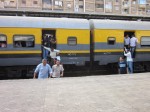
-
Sidi Gaber Station, Alexandria, Egypt: Exiting the train from the “wrong” side.
-

-
First Class Car, Express Train from Alexandria to Cairo
-
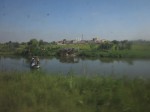
-
Countryside not far from Alexandria
-
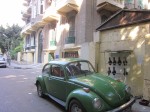
-
Outside our Apartment Building in Cairo
-

-
Outside Cafe at Marriott Hotel in Cairo
-
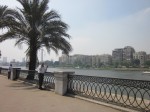
-
Along the Corniche in Cairo
-
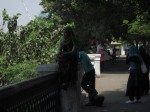
-
Street Scene along the Corniche in Cairo
-

-
View of the Nile from a 10th Floor Apartment in Cairo
-

-
Evening View of the Nile from a 10th Floor Apartment in Cairo
-

-
Interior Ministry Building in Cairo, Burned During Protests
Taking a taxi to Ramses Station for our return to Alexandria was interesting. I thought I had done well to bargain for 10 £E, but then the driver got in the car and turned on the meter. As an important aside here; generally speaking, there are two types of taxis in Cairo, black ones and white ones. The black ones are older, run down, and without air conditioning. The white ones are newer, nicer, have AC, and, of course, are therefore a bit more expensive. Traffic was incredibly slow and bumper-to-bumper most of the way; it was good to have air conditioning. Not surprisingly, when we go to the train station the meter displayed 15.5 £E. That’s about $2.50 USD and that driver earned every cent of it, earlier bargaining notwithstanding.
Negotiating Egyptian train stations at first seems daunting, but it turns out to be really easy, thanks to the kindness of strangers. Walk onto a platform, and look around. Inevitably, someone comes over, asks where you’re going in English, and tells you where to wait. Since the tickets have the car number and seat number in both Arabic and English the rest is easy.
As we got off the train in Alexandria, we were again offered taxis for exorbitant fares, but this time we knew what to do. Drivers asked for 50 £E; we knew the fare should be about five £E, ten max. We just took the nearby tram for the equivalent of four cents each and felt like we were locals, heading home after a trip to the big city.
Read Full Post »

